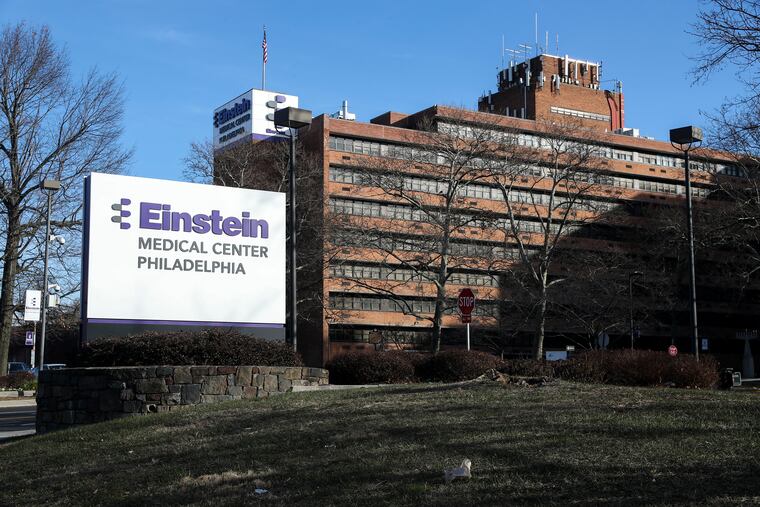How Philadelphia hospitals are protecting the mental health of workers treating coronavirus
Some Philly hospitals have begun coronavirus-specific wellness initiatives or expanded existing programs for their employees to help them cope with the stress of the pandemic.

When Francisco Aguilar is at home between shifts at Einstein Medical Center Philadelphia, he often decompresses by ordering takeout from a local restaurant or making cocktails. Aguilar, chief resident in the division of medicine, then takes pictures to document those experiences, and sends them to a WhatsApp group of fellow residents to earn “points” for taking care of his mental health.
“The Health Cup is something that we came up with a little while ago, where residents split into four teams and compete to see who can earn the most points for doing wellness activities,” Aguilar said. “Like playing with your kids, for example, earns a certain number of points. Or having a movie night, FaceTiming with your friends or family, or doing a home workout.”
More doctors are recognizing how important the program is because of the increased stress and fear of the coronavirus pandemic, he said. Focusing on wellness has alleviated some of those feelings for residents.
“There is still fear,” Aguilar said. “But everyone is hanging in there with good spirits.”
Doctors and nurses are thought to be at increased risk of contracting the coronavirus, and health-care workers already experience higher rates of depression and burnout than the general public. The COVID-19 pandemic is expected to worsen mental health issues in the industry.
As a result, some Philly hospitals have introduced coronavirus-specific wellness initiatives or expanded existing programs for their employees. At Einstein, employees are offered psychological “first aid” in the virtual support sessions with psychiatrists and 24/7 hotlines for workers who might be struggling to cope. Penn Medicine created a workforce wellness committee, while Thomas Jefferson University Hospitals is offering employees yoga classes, virtual fitness sessions, and tips on how to home-school children.
A recent study published in JAMA Network Open found that the mental health of health-care workers in China declined as a result of treating patients with COVID-19. Mental health experts have expressed concerns about the psychological effects of the widespread lack of personal protective equipment (PPE). Moral injury, defined as “perpetrating, failing to prevent, bearing witness to, or learning about acts that transgress deeply held moral beliefs and expectations,” coming from the difficult decisions that doctors have to make about allocating resources and saving lives, is another concern.
“Anyone on the front line at this point is working under incredible circumstances,” said Lisa Bellini, senior vice dean for academic affairs at the University of Pennsylvania’s Perelman School of Medicine and the chair of Penn Medicine’s COVID-19 workforce wellness committee. “Their work and stress level is significantly greater than it usually is... Their entire support structure is disrupted. We’re not measuring burnout of our physicians, but we expect it to be 100%.”
Physicians are currently in a “heroic phase” of crisis management, Bellini said, which is characterized by a high level of activity, a low level of productivity, and a sense of altruism. This will be followed by a honeymoon period, she said, which often involves feelings of community bonding and optimism that everything will return to normal quickly.
“Then there’s going to be a prolonged period of disillusionment that’s going to be settling into a routine of intensity,” Bellini said. “That’s going to be challenging for front-line providers, and the mental health effects are going to be significant.”
» HELP US REPORT: Are you a health care worker, medical provider, government worker, patient, frontline worker or other expert? We want to hear from you.
To address these concerns, Penn’s workforce wellness committee, created about a week ago, has introduced resources such as free hotel rooms to rest in between shifts and limit exposure of the virus to family members at home, a search tool to help staff find drop-in child-care options, and sessions with trained coping coaches. The committee also launched a website for the public to submit messages of encouragement and gratitude, and received 450 entries in less than 24 hours. The messages and pictures are displayed on computer screens in Penn hospitals, so workers can see them.
Bellini said she believes many of the new wellness programs will continue after the pandemic.
"In medicine, the self-care bucket has always been the smallest, but maybe the challenges we are facing will lead to improvements there,” she said.
To Glenn Eiger, program director of Einstein’s internal medicine and preliminary medicine residency programs, communication is key. From the outset of the pandemic, he established clear lines of communication with the 93 residents he oversees. Each day, Eiger holds two video meetings to update his team with everything he knows and to answer any questions.
“I always start with a little bit of reflection, letting them know how I feel about what’s going on, how I’m coping,” he said. “I think they appreciate hearing an honest story about what’s happening at the hospital. And I answer whatever they ask me honestly. If I don’t know the answer, I try to find out from other people and get back to them.”
Eiger asked all of his chief residents to check in with their trainees on a daily basis through either a text or a call. He tries to convey to his team that “this is going to be a marathon, not a sprint.” And when Eiger gets a chance, he tries to post happy news, such as birthday wishes or photos from a virtual happy hour, on the program’s Facebook page.
“It’s super-intense what they do now,” he said. “We’re just trying to preserve normalcy as best we can. Honestly, if programs think about wellness and support their residents through one of the most incredible experiences of their medical careers, they may be the best future physicians the world has ever seen.”